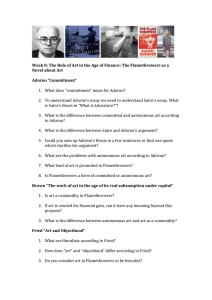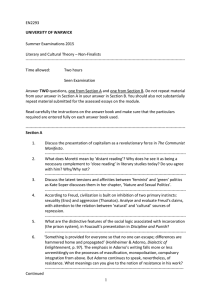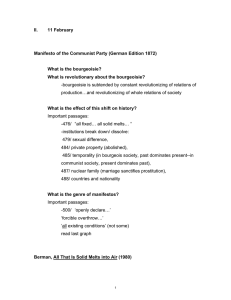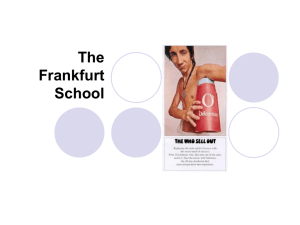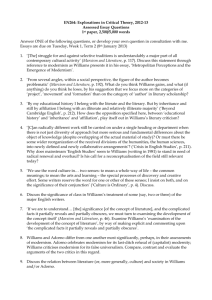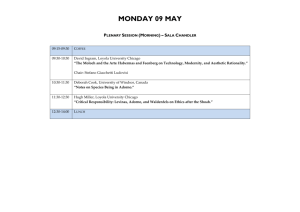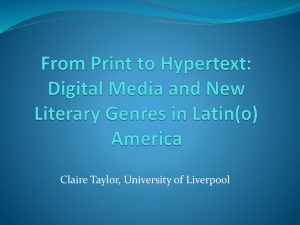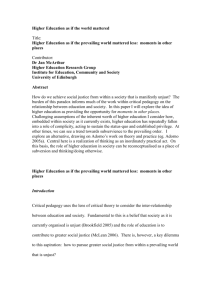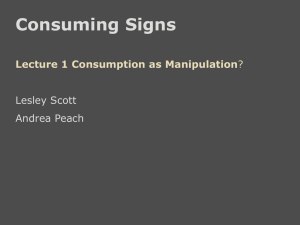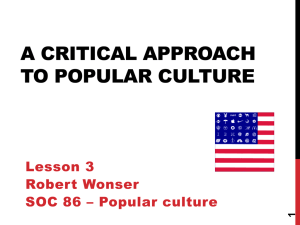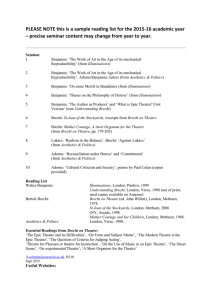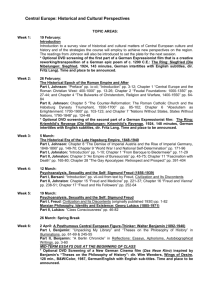Harvard-week-2 - Dark Matter Archives
advertisement
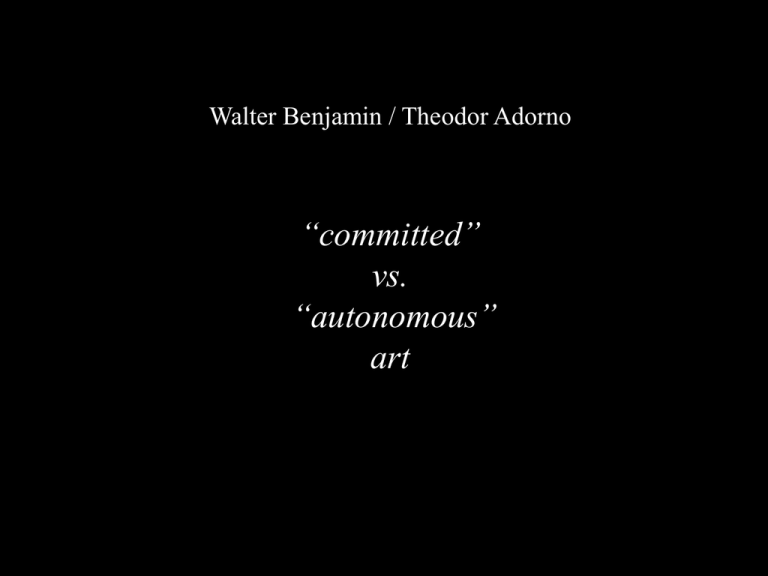
Walter Benjamin / Theodor Adorno “committed” vs. “autonomous” art What is the role of the intellectual (the poet, artist, writer, theorist, historian) within the processes of radical resistance, class struggle, or revolution? What happens to the quality of the work the artist produces when she or he is expected to be a tendentious “partisan” for political change, as well as an” artist of quality”? “A work of art that is committed strips the magic from a work of art that is content to be a fetish, an idle pastime for those who would like to sleep through the deluge that threatens them, in an apoliticism that is in fact deeply political. For the committed, such works are a distraction from the battle of real interests… Adorno …but when “works of art merely assimilate themselves sedulously to the brute existence against which they protest, in forms so ephemeral (the very charge made vice versa by committed against autonomous works) that from their first day they belong to the seminars in which they inevitably end.” Adorno For Benjamin (as for Brecht) the answer to these questions involve the release of forces that artists and intellectuals cannot simply take charge of and therefore lead. •Melting down •Engineering •Re-functionin (Umfunktioniering) “Only the literalization of all the conditions of life provides a correct understanding of the extent of this melting down process, just as the state of the class struggle determines the temperature at which –more or less perfectly—it is accomplished.” Benjamin For Adorno, art is paradoxically, both a cry against surrender to the post-Auschwitz world – and inherently made barbaric by the same political and social forces and conditions. True art is dark. Docklands Project by Loraine Leeson and Peter Dunn, London, circa 1979 Hans Haacke Manet-PROJEKT 74 An “Anti-Catalog” opposed to the Whitney Museum bicentennial exhibition, 1976 “The revolutionary intellectual appears first and foremost as the betrayer of his class of origin.” Louis Aragon 1. Didacticism of approach 2. A Cooled-Down aesthetic (anti-pleasurable – pleasure) 3. Dominance of language and use of text to anchor images 4. Anti-narrative and use of interruption (montage - Brecht) 5. Simplification of technique to achieve ends (pragmatic, tactical) 6. Radicalization of institutions rather than form or forms alone 7. Adoption of collectivized and/or collaborative forms of production 8. Art as an organizational tool/part of a broader campaign http://www.youtube.com/watch?v=3zSA9Rm2PZ A http://video.google.com/videoplay?docid=511397820540803155 Art must have an organizing function & must be a Laboratory of Ideas Example: Sergei Tretiakov: •Calling mass meetings •Collecting funds (for tractors) •Inspecting reading rooms •Persuading peasants to join collectives •Creating wall newspapers http://www.brokencitylab.org/ http://vimeo.com/1862439 http://vimeo.com/1586302 http://www.youtub e.com/watch?v=Bk eTDmHj2gg http://www.labofii.net/experiments/ “Autonomous works of art are knowledge as non-conceptual objects. This is the source of their greatness.” Adorno …but when “works of art merely assimilate themselves sedulously to the brute existence against which they protest, in forms so ephemeral (the very charge made vice versa by committed against autonomous works) that from their first day they belong to the seminars in which they inevitably end.” “The notion of a “message” in art, even when politically radical, already contains an accommodation to the world: the stance of the lecturer conceals a clandestine entente with listeners, who could only be truly rescued from illusions by refusal of it.” “It is not the office of art to spotlight alternatives, but to resist by its form alone the course of the world, which permanently puts a pistol to men’s heads.” Adorno http://www.youtube.com/watch?v=EpKLtOQqrHs http://video.google.com/videoplay?docid=34 53298926288406872# George Grosz Heartfield the Engineer, 1920 Kurt Schwitters
